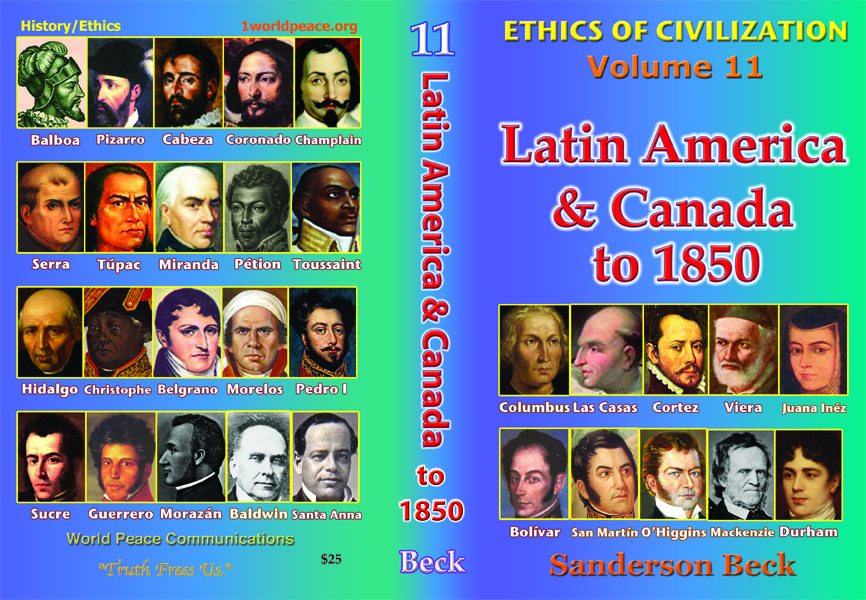
Preface
Mayans
Columbus and the Caribbean
Caribbean & Panama 1500-21
Caribbean & Central America 1521-80
Las Casas on the Spanish Conquest
Spanish & French West Indies 1580-1744
British & Dutch West Indies 1580-1744
British & French West Indies 1744-1850
Haiti’s Slave Revolution 1749-1817
Haiti & Santo Domingo 1817-50
Cuba 1744-1850
Puerto Rico 1744-1850
Central America 1580-1744
Central America 1744-1817
Central America & Confederation 1817-52
Costa Rica 1835-50
Guatemala & Carrera 1837-50
El Salvador 1839-50
Honduras 1839-50
Nicaragua 1838-50
Panama 1817-50
Incas to 1532
Pizarros & Peru 1532-80
Peru & Chile 1580-1744
Peru 1744-1817
Portuguese in Brazil 1500-80
Brazil & the Dutch 1580-1654
Brazil & Vieira 1654-1700
Brazil & Slavery 1700-44
Brazil under Portugal 1744-88
Brazil’s Rise to Power 1788-1817
Brazil’s Revolution 1817-22
Brazil’s Independence 1823-30
Brazil 1831-50
Guiana to 1744
Guiana 1744-1850
Southern South America to 1850
Rio de la Plata 1580-1744
Rio de la Plata 1744-1810
Chile 1744-1817
Argentine Revolution 1810-17
Argentine Revolution & Paraguay 1817-30
Argentina & Paraguay 1831-50
New Granada 1525-1744
New Granada 1744-1814
Bolivar in Venezuela 1808-11
Bolivar in Venezuela 1812-13
Bolivar & Revolution 1814-17
Bolívar & Venezuela 1817-23
Peru’s Revolution 1819-22
Bolívar in Peru & Bolivia 1823-25
Bolívar & Colombia 1817-25
Chilean Revolution 1817-30
Bolívar & Northern Conflicts 1826-30
Peru 1831-50
Bolivia 1829-50
Venezuela 1830-50
New Granada (Colombia) 1830-50
Ecuador 1830-50
Chile 1831-50
Toltecs & Anasazi
Aztecs to 1519
Cortes in Mexico 1519-28
Mexico 1528-80
Cabeza, Coronado, Soto & Menendez
Mexico 1580-1700
Northern Mexico 1580-1700
Sor Juana Inés de la Cruz
Mexico 1700-1768
Mexico 1768-1809
Northern Mexico 1768-1809
California Missions 1768-1809
Mexico’s Struggle for Independence 1810-17
Mexican Independence & Iturbide 1817-23
Mexico of Victoria & Guerrero 1823-31
Mexican California 1810-31
Northern Mexico & Texas 1810-31
Mexico & Santa Anna 1832-44
Mexican California 1832-45
Northern Mexico & Texas 1832-45
Mexico & the American War 1845-50
Hiawatha & the Iroquois League
Cartier & Champlain in Canada 1534-1642
French & the Iroquois 1642-63
Canada of Louis XIV & Frontenac 1663-80
Canada & La Salle 1680-88
Canada, Frontenac & War 1689-1713
Canada Between Wars 1713-44
Louisiana 1699-1750
Canada & New England 1744-53
English-French War 1754-57
English Defeat of New France 1758-63
British Canada during Revolution 1763-83
British in Canada 1783-1812
Canada in War & Peace 1812-17
Canada under British Rule 1817-29
Canada & Mackenzie 1830-36
Canadian Rebellion & Reforms 1837-39
Canadian Union 1840-44
Newfoundland, Nova Scotia & New Brunswick
Canadian Union 1845-49
Mayans, Aztecs & Incas
Spanish Colonies 1492-1744
Brazil 1500-1744
Latin America 1744-1817
South America 1817-50
West Indies & Central America 1817-50
Mexico 1817-50
Evaluating Latin America to 1744
Evaluating Latin America 1744-1850
French & Canada 1534-1812
Canada 1812-1850
Evaluating Canada to 1850
General
Mayans, Toltecs, Aztecs & Incas
Latin America
Colonial Latin America
South America
Caribbean
Central America
Mexico
Canada
The origins of civilization in the American continents were
much more isolated than those in Africa, Asia, and Europe.
Indigenous tribes and nations developed their own traditions that were usually
more egalitarian and respectful of women; but the building of cities and the
recording of history were limited to a few places, particularly in central America
and the Andes mountains.
The Mayans were advanced in many ways, amd they suffered from wars
between their cities until they fell in the ninth century of our era.
Quetzalcoatl was a spiritual teacher for the Toltec culture,
which flourished in the 12th century.
The Mexica (Aztecs) by conquest rose to be a powerful empire in the 15th century
that was being threatened with rebellion when Cortes and the Spaniards arrived in 1519.
The Incas also became a strong empire in the Andes region;
they were known for taking care of all their people
so that none would have to turn to crime for survival.
They too were weakened by a civil war when Pizarro came in 1532.
Suddenly in 1492 with the audacious western voyage by Columbus
that was financed by Spain the rest of the world began to become aware of
a “new world” in the western hemisphere.
The ensuing conquest by the rapacious Spaniards in the 16th century is a
horrendous story of imperialist violence, arrogance, and exploitation
along with some effort by missionaries to help the natives while transforming their culture.
These crimes along with epidemics caused by the diseases the Europeans brought
resulted in a genocidal reduction of native populations
wherever the Spaniards and Portuguese colonized.
The tales of Columbus and other explorers in the Caribbean, Cortes in Mexico,
and the Pizarros in Peru reveal the cruelty of power and greed.
The Europeans used steel, gunpowder, and horses to overwhelm resistance
to their conquests, and the Christian religion was imposed by demanding conversion,
destroying temples and idols, and enforcing dogma with the Inquisition.
Only such great reformers as Las Casas in the Spanish realm
and the Portuguese Vieira in Brazil offered alternatives that were more just and peaceful;
but they were voices in the wilderness among the greedy colonists.
When they found that Africans survived better and worked harder
than the Indians as slaves, hundreds of thousands were imported from Africa.
Successful colonization by the English, French, and Dutch began early in the 17th century,
and they came mostly to North America as well as the West Indies.
Champlain founded Quebec in 1608 and was able to develop alliances
with the Algonquins and Hurons, and they fought the Five Nations
the French called the Iroquois, who were gaining power
because of their successful confederation.
The French came to Canada primarily to trade for furs or as missionaries.
In the 1680s La Salle connected Canada to the mouth of the Mississippi River.
The French imported few slaves except in the West Indies and Louisiana.
The Dutch settled in the Hudson River valley and purchased
the island of Manhattan from the natives for trinkets.
The Dutch had many ships for trading and also governed part of Brazil for a while,
and the Portuguese defeated them there in 1654.
Ten years later the English overwhelmed New Netherland and renamed it New York.